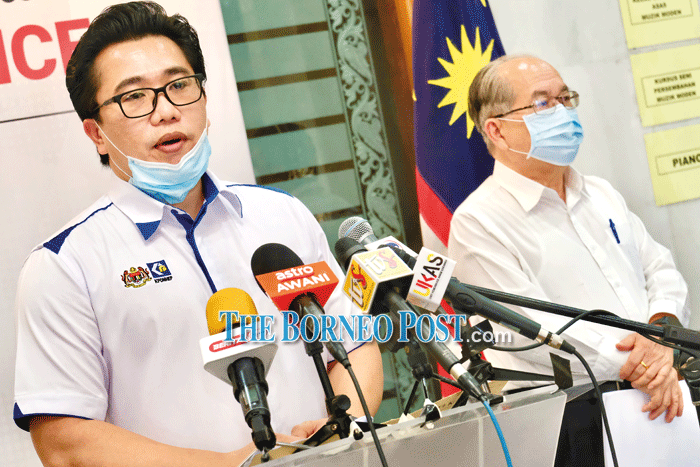
Tan (left) addresses the press conference. At right is Uggah. — Photo by Muhd Rais Sanusi
KUCHING: The Ministry of Domestic Trade and Consumer Affairs (KPDNHEP) will ensure the price standardisation programme implemented since 2009 will continue to be enforced in Sarawak.
Its director in Sarawak, Datuk Stanley Tan, said this programme helps to standardise the prices of controlled items in rural areas so that the prices are similar to that in urban areas.
He also said this programme initiated by the federal government has benefited the rural populace not only in Sarawak but also Sabah and a few rural areas in Peninsular Malaysia.
“This is because prices (of goods) are more expensive in rural areas than cities due to high transportation cost,” he said at the daily Covid-19 update press conference yesterday.
He was invited to the press conference by Sarawak Disaster Management Committee (SDMC) chairman Datuk Amar Douglas Uggah Embas to clarify a news report that the price standardisation programme was a state government initiative.
Uggah, who is also Deputy Chief Minister, said he needed to have the erroneous news report corrected because the programme was in fact implemented by the federal government benefiting the people in Sarawak.
Tan cited Kampung Patik Penan located in the interior of Miri division as an example of how the programme had greatly reduced price of essential goods.
He said before the programme, the price per kg of sugar and flour was RM5 while cooking oil was RM8; 10kg packet of rice (RM60); LPG (RM130 per cylinder); RON95 (RM6.40 per litre); and diesel (RM6.10 per litre).
He pointed out that to reach Patik Penan village requires a journey from Miri to Lapuk town of about 30 km on tar-sealed road before proceeding to Bario over 435 km on logging roads and walking for three to four days.
After the federal government subsidised transportation costs under the programme, Tan said the price of sugar is RM2.85 per kg, flour (RM1.35 per kg), cooking oil (RM2.50 per kg), 10kg packet of rice (RM29), LPG (RM28.60 per cylinder), RON95 (RM1.31 per litre) and diesel (RM1.45 per litre).
He also said the federal government had identified 79 transporters to deliver consumer goods to 421 areas with 800 posts selected to sell the goods under controlled prices in rural and remote areas.
On another matter, Tan said the Festive Season Maximum Price Scheme for Hari Raya Aidilftri took effect from yesterday until June 3 while the same scheme for Gawai Dayak will be from May 28 to June 3.
He said nine essential items under the scheme for Aidilfitri and 111 items under the same scheme for Gawai cannot be sold beyond the ceiling price.
The nine types of Aidlfitri essential items under the scheme are live chicken; standard chicken; super chicken; imported beef, Grade A eggs, Grade B eggs, Grade C eggs, whole coconut and grated coconut.
For Gawai, the 11 types of essential items under the scheme are live chicken; standard chicken; super chicken; Grade A eggs; Grade B eggs; Grade C eggs; live old chicken; chicken wing; pork (meat and fat), pork belly and live pig.
Tan said although the Conditional Movement Control Order (CMCO) is now enforced, the Maximum Price Scheme should be implemented as public demand for specific daily necessities for these festivities is high.
Those found to be selling controlled items at a higher price could face a notice under Section 21 of the Price Control and Anti-Profiteering Act 2011.
Individual traders could face a fine of up to RM100,000 or a jail term of up to three years, or both, or pay a compound of up to RM50,000 if found guilty of profiteering.
Companies could also be fined up to RM500,000 or compounded up to RM250,000 if found guilty.
Traders could be fined up to RM10,000 or compounded up to RM5,000 for not displaying pink price tags; while companies could be fined up to RM20,000 or compounded RM10,000.
